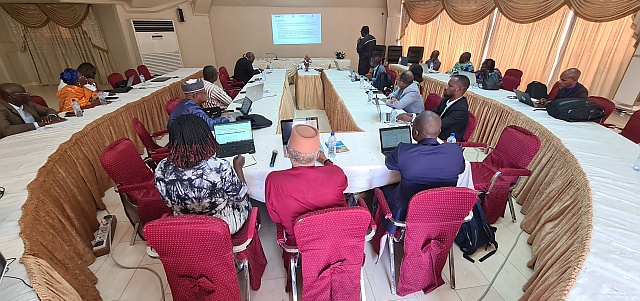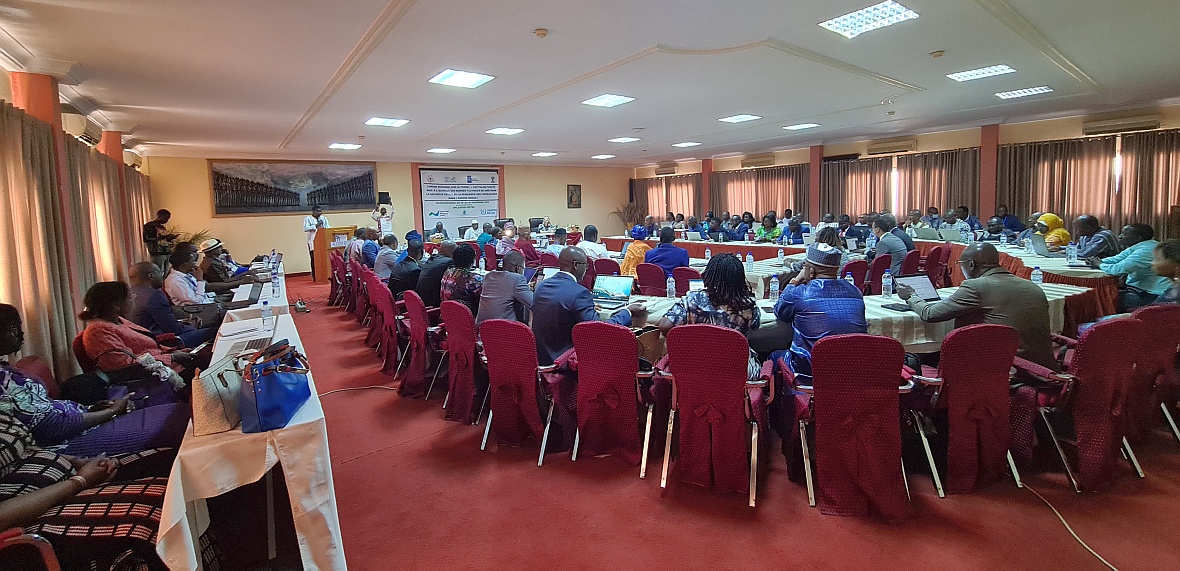The Regional Forum was organized by the WAEMU Commission in collaboration with the Ministry of the Environment, Water and Sanitation of Burkina Faso, the Embassy of the Kingdom of the Netherlands in Burkina Faso, GWP-WA, Pôle Eau Dakar, the Secretariat of the Water Convention and the United Nations Environment Programme (UNEP)-DHI Centre for Water and the Environment.
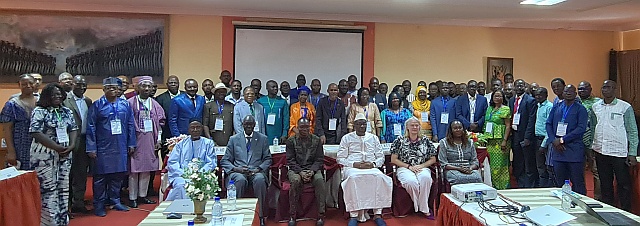 The initiative is part of the process to "promote innovative and successful best practices in the implementation of IWRM for water security in the WAEMU region". This process is part of the implementation of: (i) the West African Water Resources Policy (WAWRP), drawn up in a participatory manner by the ECOWAS Commission in close collaboration with the WAEMU Commission and CILSS, and (ii) the Common Environmental Improvement Policy (PCAE) and the Integrated Water Resources Management (IWRM) Action Plan 2019-2030 in the WAEMU region.
The initiative is part of the process to "promote innovative and successful best practices in the implementation of IWRM for water security in the WAEMU region". This process is part of the implementation of: (i) the West African Water Resources Policy (WAWRP), drawn up in a participatory manner by the ECOWAS Commission in close collaboration with the WAEMU Commission and CILSS, and (ii) the Common Environmental Improvement Policy (PCAE) and the Integrated Water Resources Management (IWRM) Action Plan 2019-2030 in the WAEMU region.
The main objective of the regional dialogue is to advance the implementation of IWRM for water security and resilient development; through the promotion of innovative and successful good practices in implementing the approach in the WAEMU Space.
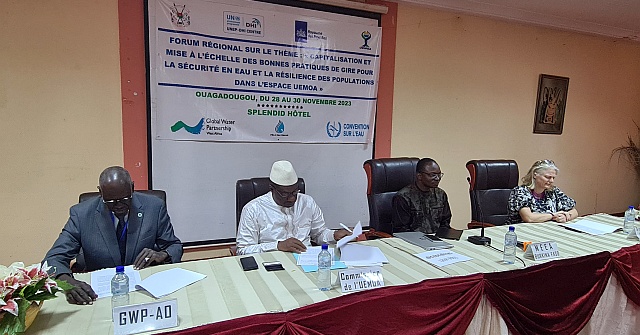 The Regional Forum was co-sponsored by: i) the Minister of the Environment, Water and Sanitation; ii) the WAEMU Commission President; and iii) the Ambassador of the Kingdom of the Netherlands to Burkina Faso.
The Regional Forum was co-sponsored by: i) the Minister of the Environment, Water and Sanitation; ii) the WAEMU Commission President; and iii) the Ambassador of the Kingdom of the Netherlands to Burkina Faso.
Two thematic sessions on (i) Enabling environment for IWRM _ Functional institutions and frameworks for participation; and (ii) Management instruments and programs _ Innovative and sustainable financing mechanisms for IWRM enabled participants to make presentations followed by rich exchanges of some forty proven good practices in IWRM implementation at local, national and transboundary levels in the WAEMU Space.
These exchanges led to a number of improvements, which will enable the institutions concerned to submit the final versions of the best practices in the very near future, with a view to publishing the consolidated manual in the 1st quarter of 2024. This manual will be launched at the 10th World Water Forum from May 18 to 24, 2024 in Bali, Indonesia.
In recognition of the merit of the bearers of the best practices, the list of six institutions having presented the best practices was announced. These institutions will be sponsored to take part and present their practices at the World Water Forum in Bali. They are:
|
NUMBER |
INSTITUTIONS |
TITLE OF PRESENTATION |
SCALE |
|
1 |
VBA |
Results and prospects of the "Integrating flood and drought management and early warning for climate change adaptation in the Volta basin" project». |
Transboundary |
|
2 |
POLE EAU Dakar |
Transboundary cooperation on the Senegal-Mauritania aquifer basin (BASM) |
Transboundary |
|
3 |
DGRE)/ MEEA/ Burkina Faso |
Setting up water agencies in Burkina Faso |
National |
|
4 |
DGEAU/ BENIN |
Plan Delta : Mise en œuvre efficiente de la GIRE pour la Résilience aux Changements Climatiques dans le Delta de l’Ouémé |
National |
|
5 |
Gourma Water Agency |
Community monitoring of water resources through community relays |
Local |
|
6 |
PNE-Bénin |
Reversal of the degradation process of a TBV of the Mékrou River at Yakabissi in the commune of Kouandé (Mékrou/Niger Basin sub-basin) |
Local |
The Chairman of the Scientific and Technical Committee also presented an additional list of six (06) other institutions that could benefit from sponsorship for their participation in the 10th World Water Forum, with the support of the partners. These institutions are listed in table 2 below.
|
NUMBER |
INSTITUTIONS |
TITLE OF PRESENTATION |
SCALE |
||
|
7 |
Water Museum Burkina Faso |
The holistic and integrated dimension of water in a museum space: the case of the Water Museum of Burkina Faso |
National |
||
|
8 |
DNH/ CWP-Mali |
The experience of the Sélingué Reservoir and Markala Dam Water Management Commission (CGESM) |
National |
||
|
9 |
SP/PANGIRE |
Successful implementation of the Mékrou Phase 2 project in Niger |
National |
||
|
10 |
OMVS |
Framework and implementation methods for IWRM in the Senegal River Basin |
Transboundary |
||
|
11 |
WaterAid Burkina Faso |
Capacity-building of local communities in the context of climate change through community monitoring of water resources |
Locale |
||
|
12 |
FASO KOOM |
Protection of the banks of the Nakanbé river in Béguedo and Niaogho over 17 km by marking out, tree planting and development of 7 ha of market gardening perimeter for vulnerable people |
Locale |
||
The Forum made it possible to formulate numerous recommendations addressed to the States of the area, the Regional Economic Communities (WAEMU and ECOWAS Commissions), civil society organizations, local authorities, transboundary basin organizations and financial and development partners.
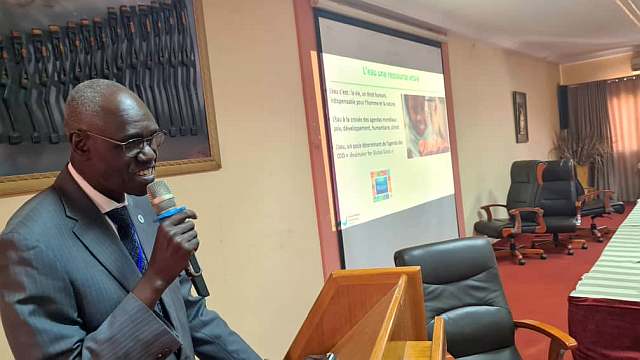 The WAEMU Commission has indicated its intention to organize this Regional Forum every two years, to enable progress in IWRM implementation to be monitored and experiences to be shared on a larger scale.
The WAEMU Commission has indicated its intention to organize this Regional Forum every two years, to enable progress in IWRM implementation to be monitored and experiences to be shared on a larger scale.
The Regional Forum enabled participants to:
- to discuss the issues, achievements, challenges, opportunities and prospects for implementing IWRM for water security and resilient development in the WAEMU region;
- learn about innovative and successful IWRM best practices in the WAEMU region, and carry out a self-assessment focusing on implementation approaches, results achieved, lessons learned, and their potential for sustainability and replicability;
- propose interventions and recommendations to be implemented at different levels to deepen, consolidate and scale up innovative and successful IWRM implementation best practices documented to ensure water security and resilient development in the WAEMU Space;
- recognize the merit of institutions or organizations that have developed innovative and successful IWRM implementation practices documented at local, national and transboundary levels in the WAEMU space.
